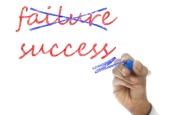When most creative people pursue their goals they imagine what it would be like to reach them (Hope of Success). And they also worry that the goal will not  be reached (Fear of Failure). Those two emotions go together and are reverse sides of the same coin. That creators’ fear of failure is perfectly natural and is to be expected whenever you’re facing a difficult, challenging task, such as a writer crafting a play if she’s never written one before, or a lithographer preparing a work for an important contest.
be reached (Fear of Failure). Those two emotions go together and are reverse sides of the same coin. That creators’ fear of failure is perfectly natural and is to be expected whenever you’re facing a difficult, challenging task, such as a writer crafting a play if she’s never written one before, or a lithographer preparing a work for an important contest.
But at times the fear of failing becomes a major psychological obstacle that keeps creators from reaching the success and satisfaction they’ve been hoping for. Creators who are dominated by the fear of not succeeding, but failing have developed—often without realizing it–characteristic tactics for protecting themselves from enduring what often is not just a fear of failing, but a much more dreadful terror of failing. Ironically, those tactics do more to contribute to failure than to prevent it. It’s worthwhile looking at those tactics that you might recognize in yourself so that something might be done about them.
Rather than enduring the misery of experiencing that terror of failing the person harried by it may:
- Avoid competing with others of comparable ability. They prefer being the big fish in the little pond.
- Be perfectionists. They don’t attempt things in which they won’t be able to attain perfection or near perfection. The tactic here is to carve out a very narrow area of competence in which they excel and can approximate perfection.
- Prefer very easy or very difficult tasks, nothing in the middle. In contrast, most high achievers generally pursue tasks and goals they have a one in three or two in three chance of succeeding at. Not a sure thing and not an impossible thing.
- Avoid displaying their abilities in public. A pianist may be able to perform beautifully in private, but shy away from performing in front of people.
- Avoid attempting anything important. The more important the activity, the more they avoid it. A writer may avoid trying to get his work published even though publication is the logical outcome of the writing process.
- Avoid taking risks. Most creators who become eminent experience turning points at which they take a risk which their less eminent contemporaries are too timid to take. Fear of taking chances melts in the face of a strong and urgent purpose and self-confidence (If you’ve been reading my posts you can’t have helped but notice I’m enamored with self-confidence because it, along with skill, is the antidote to most creator’s main problems, including self-doubt and discouragement).
- Have trouble performing under time pressure. They panic as they approach the deadline. Even the word “deadline’ scares them. They delay. They give up. They shut down. More confident creators are challenged by a race against time and are often the most excited and highly focused and at the height of their skills when the clock is ticking. The best tactic is to forget about the deadline completely and focus totally on the task.
- Prefer practice and games rather than the real thing.
- Seek social support. People who fail tend to have as friends others who fail.
- Have unrealistic expectations–oddly enough, on the high side. Asked to estimate how well they’ll do at achieving a goal they will say they’ll do far better than they actually will. I had an egotistical friend in college who wrote a paper for English in which he said he was brilliant, a great lover women couldn’t resist, handsome, a wonderful athlete, and a conversationalist who could charm birds out of trees. The professor returned his paper with the comment scrawled on it: “It’s a shame you can’t add a command of the English language to the list of your other accomplishments.”
- Misjudge past performance. They also exaggerate how well they did in the past.
- Reject the measure of a skill. For example, the student who doesn’t do well and says, “Getting good grades doesn’t mean a thing.”
- Avoid measurements of their performance. They don’t want to know how well or poorly they’re doing, for if they knew they might have to admit they failed. Without contrary information they can always say, “I’m doing pretty well.” At work, they are the employees who dread performance evaluations. They might even arrange to stay home on the day of the evaluation. The best writers, best painters and actors are just the opposite. They want to know if they’re doing well or poorly. They welcome feedback, and actively seek it, feedback that is rapid, specific, and helpful. They are always asking about their work, “Well, what d’ya think of it?” Studies of highly creative people show that they accept helpful guidance and have “an openness to advice.”
- Not try. A fear that dominates many creators and makes them quit trying to succeed is the fear of failing to reach financial success, or just break even. Writer Francois Voltaire and painter Claude Monet won
 fortunes in government lotteries and were able to devote themselves completely to their work. But Nobel Prize winner William Faulkner spent most of his writing life in virtual poverty. When his picture appeared on the cover of Time magazine he couldn’t pay his electric bill of $35. He wrote: “People are afraid to find out how much hardship and poverty they can stand. They are afraid to find out how tough they are.” But financial risk is part of the creator’s life style and for many writers the fear of being broke can be exhilarating, a source of creative energy. Most creators perform better under some amount of financial pressure. Sherwood Anderson’s publisher thought financial security would help him produce more and sent him a weekly stipend. But that made him less productive, and Anderson asked them not to send it anymore: “It’s no use. I find it impossible to work with security staring me in the face.” In The Courage to Write Ralph Keyes says, “Knowing that there is a direct line between putting words on a page and food on the table keeps me focused.” Picasso said he was rich but tried to work as though he was poor.
fortunes in government lotteries and were able to devote themselves completely to their work. But Nobel Prize winner William Faulkner spent most of his writing life in virtual poverty. When his picture appeared on the cover of Time magazine he couldn’t pay his electric bill of $35. He wrote: “People are afraid to find out how much hardship and poverty they can stand. They are afraid to find out how tough they are.” But financial risk is part of the creator’s life style and for many writers the fear of being broke can be exhilarating, a source of creative energy. Most creators perform better under some amount of financial pressure. Sherwood Anderson’s publisher thought financial security would help him produce more and sent him a weekly stipend. But that made him less productive, and Anderson asked them not to send it anymore: “It’s no use. I find it impossible to work with security staring me in the face.” In The Courage to Write Ralph Keyes says, “Knowing that there is a direct line between putting words on a page and food on the table keeps me focused.” Picasso said he was rich but tried to work as though he was poor.
- Reject responsibility for their failures. If you wipe your hands of responsibility, all pressure is off and all fear of failing disappears. You might know creators who go to great lengths to avoid responsibility. They concoct elaborate excuses for their failures.
 A not uncommon fear of failure among creators takes the form of “encore anxiety.” It is the fear after producing a successful first work that no matter what you do you won’t be able to produce a second work that’s as good or as successful.
A not uncommon fear of failure among creators takes the form of “encore anxiety.” It is the fear after producing a successful first work that no matter what you do you won’t be able to produce a second work that’s as good or as successful.
To overcome fear of failure, go down the above list and develop counter-tactics. For example:
- Always try; don’t not try.
- Be interested in measurements of your performance; don’t avoid them.
- Consider your past achievements dispassionately; put your ego aside.
- Associate with other successful creators of comparable ability, not failures with less ability.
- Pursue goals that aren’t easy, goals that are a little out of reach.
- Open yourself up to areas in which you haven’t yet mastered perfection
- Take more chances; that shouldn’t he hard because creators are attracted by risks.
- Have realistic, not unrealistic, expectations.
- Judge your performance as accurately as you can.
- Actively seek feedback on your performance; don’t avoid it.
- Have no fear of financial pressures; let them motivate you.
- Be confident that you will succeed again.
- Don’t be intimidated by deadlines and time pressures; they help you perform better.
- Don’t fear competition. It may bring out the best in you and help you reach a level of success in your craft you’ve never dreamed of.
- Accept responsibility for failures.
 All creators are capable of overcoming fears of failing, and when they aren’t extreme and debilitating, those fears can be positive—a push, an incentive– and have helped many creative people reach success.
All creators are capable of overcoming fears of failing, and when they aren’t extreme and debilitating, those fears can be positive—a push, an incentive– and have helped many creative people reach success.
© 2016 David J. Rogers
For my interview from the international teleconference with Ben Dean about Fighting to Win, click on the following link:
Order Fighting to Win: Samurai Techniques for Your Work and Life eBook by David J. Rogers
or
Order Waging Business Warfare: Lessons From the Military Masters in Achieving Competitive Superiority
or


Thank you David, not only remedies for fear of failure but advice and motivation to move beyond mediocrity and to transmute the paralysis of fear into the exhilaration of striving.
LikeLike
Michelle, I love your attitudes. Whatever you have to say is always so appropriate, so inspiring, and so skillfully expressed. When I see you have made a comment, I say to myself, “This is really going to be good,” and I’m never disappointed. I do hope that my blogs are beneficial for people and supportive especially of what creative people are trying to accomplish. Tomorrow I’ll be turning the page on your lovely calendar. It brings cheer to me every day. Right now I’m going over to your newsletter to make a comment on your “Rose garden tour.” Best wishes.
LikeLike
Great post! Just what I needed to read today. Thank you!
LikeLike
Thanks, Wendy. Glad to help. Stay in touch.
LikeLike
Great post David!
Fear is a comfort zone. Taking risks help us to move on.
Thank you for sharing your thoughts.
LikeLike
Marilucas, It’s good to hear from you. And I see you’re now able to post on the blog. You’re so right about fear. We sometimes grow accustomed to it and don’t realize how it’s stopping us from achieving what we should and are capable of. Just 15 minutes before you sent this to me, I was in the store looking for you. Sorry I missed you.
LikeLike